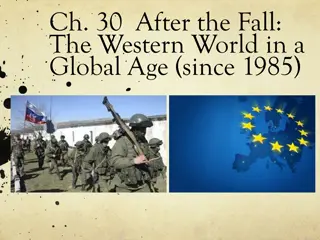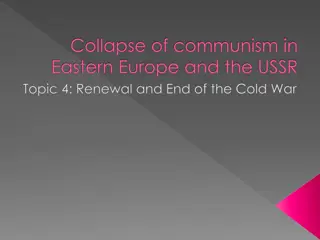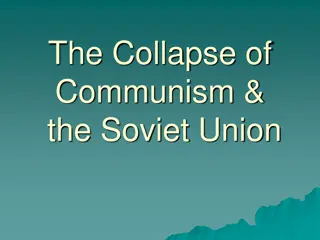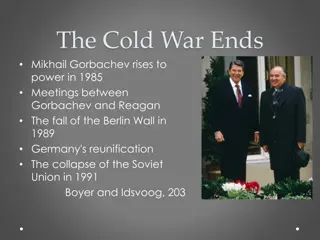The Fall of the Soviet Union: Gorbachev's Reforms and Global Impact
In the late 20th century, the collapse of the Soviet Union under Gorbachev's leadership ushered in a new era of economic, political, and social change. Gorbachev's policies of glasnost and perestroika opened up Soviet society, leading to nationalist movements and ultimately the dissolution of the US
0 views • 12 slides
Fall of Communism in Eastern Europe and the USSR: Renewal and End of the Cold War
The dissolution of the Soviet Union in December 1991 marked the end of an era, with the Revolution of 1989 seeing Soviet states revolt, culminating in the fall of the Berlin Wall symbolizing the collapse of Communism. Gorbachev's resignation on December 25th, 1991, swiftly followed by the dissolutio
0 views • 8 slides
The Collapse of Communism and the Soviet Union: A Historical Overview
The collapse of communism in the Soviet Union was influenced by factors such as a home-grown insurgency, the rise of the Polish trade union Solidarity, and the reforms initiated by Mikhail Gorbachev. Solidarity, led by Lech Walesa, played a significant role, supported by the Catholic Church. Gorbach
0 views • 15 slides
The End of the Cold War: A Reflection on Nuclear Menace in the 1990s
Mikhail Gorbachev's rise to power in 1985 marked the beginning of the end of the Cold War, leading to significant events such as the fall of the Berlin Wall in 1989 and the reunification of Germany. Despite the waning nuclear arms race, nuclear themes continued to dominate mass culture in the late 1
0 views • 13 slides



